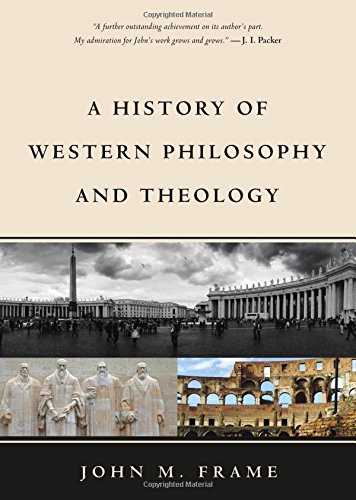
John Frame has written on a variety of topics related to philosophy, theology, apologetics, and other related matters. He has taught a course on the history of western philosophy and theology (many times, I’m sure), which you can find on iTunesU. He has now solidified the full material of this course into a nearly 1,000 page volume.
But don’t let the size fool you. Positively, it’s more manageable than you might imagine because the history only spans 500 pages. The rest of the ~450 pages are composed of 20 appendices (!), some published before and some not, as well as a glossary, some indices, and an annotated bibliography of philosophical resources. While the appendices might be helpful on various topics of interest (lots of them are book reviews), it’s the 500 pages of history I’m concerned to evaluate here.
The Fame of Frame
Frame majored in philosophy at Princeton, studied philosophical apologetics under Cornelius Van Til at Westminster, and then studied in Yale’s graduate program for philosophical theology. As you read through his chapters on various philosophers, it is obvious he understands the authors under scrutiny. However, as even Frame will acknowledge (e.g., with the Greeks), his analysis is the traditional one. Recent scholarship on figures such as Thales, Heraclitus, and others in the Greek world is not often worked into Frame’s analysis. In this sense, his history is safe (sticking to what has been accepted as true for a long time), but lacking in the further detail a more focused book could give on recent scholarship.
Having said this, I can attest that his expositions are skillful. For example, his handling of Kant and Wittgenstein organize clearly their systems of thought. The former is difficult because of its complexity and Kant’s obscurity, while the latter is difficult because of his shift in positions from ‘early Wittgenstein’ to ‘late Wittgenstein.’ For those starting out in philosophy, Frame’s work is helpful.
However, there are many limitations.
First, this is a history of Western philosophy and theology. Two of the standard histories of Western philosophy are W. T. Jones’ 5 volume set and Bertrand Russel’s one volume work. Jones does figure the important theological figures such as Augustine, Aquinas, and Luther, but beyond the Reformation theologians do not feature in his history because they cease to be philosophers. Similarly for Russel, he has a section on the Reformation, but then theologians disappear. So one limitation of Frame’s book is that he includes so many theologians, such as Calvin, Schleiermacher, Barth, Bultmann, Bonhoeffer, Moltmann, and many others. The result is that both the philosophical and theological history is too concise. I would rather have seen the appendices omitted and Frame’s history extended to the full 1,000 pages, which would still be rather short in comparison with other histories of philosophy.
Second, while selectivity is a problem every historian has to navigate, I found the final chapter on recent Christian philosophy very imbalanced. He covers Kuyper, who was more of a political philosopher and theologian than a philosopher, and then Dooyeweerd, Gordon Clark, Esther Meek, and Vern Poythress, among others. If this is really the breadth of Christian philosophy today, the New Atheists wouldn’t have much to worry about because philosophers such as William Lane Craig wouldn’t be following them around the globe to destroy them in debates. (Craig gets mentioned on one page among a list of “other” analytic philosophers, about 2 of 25 of whom were worth mentioning in a history of philosophy and who deserved sections far more than other figures mentioned.) Of course, this is a history from a Reformed perspective (unashamedly), and I suppose Frame might only respond that he is writing for his tribe and giving attention to figures that are significant within his stream of philosophical thinking in the Reformed tradition. That is fine if that’s his intent, but one should be aware of the limitation it places on this volume as a history of Western (and not just Reformed) philosophy.
The Many Strengths
Of course one could continue with quibbles until the sun goes down, but let me extol some strengths of this volume:
- The inclusion of theologians is helpful for seeing how philosophy has influenced theology.
- The brevity allows those who are just beginning in philosophy to get a broad sweep in a manageable amount of pages.
- The Reformed perspective is useful for a large percentage of Christians who identify with that tradition.
- The writing format is–as usual–casual and easy to read, but academically informed.
Frame’s work is a monument to his scholarship and a labor of love for the church. While it does have its limitations, I would be happy to recommend it to those starting out in philosophy and want a Christian perspective. For a complementary book that argues for Christian approaches to each topic of philosophy, use DeWeese’s Doing Philosophy as a Christian. And finally, I would suggest buying W. T. Jones’ 5 volume set (vol. 1 here) along with Frame’s work so you can have a more in-depth analysis of each philosopher from a perspective that is not Christian but also understand Christianity well and is charitable to all.
Preview or buy Frame’s work on Amazon.


